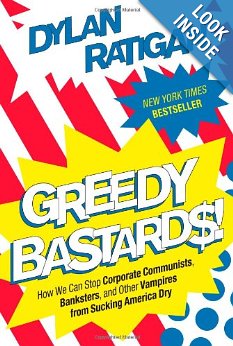from huffpost
Unintentional self-parody was the result to a coordinated effort by the systemically dangerous institutions' (SDIs) press flacks to gin up outrage that the Department of Justice (DOJ) would have the audacity to sue the SDIs' for their manifold violations of the law. TheWall Street Journal recalled one of its former opinion page pundits to active duty as a shill for the Street. George Melloan's August 25 column warned:
"If dubious prosecutions continue to mount, they could backfire on the regulatory agencies and further diminish sinking public confidence in government. Ask the folks at the IRS."
Given the fact that there are zero prosecutions of any of the elite bankers whose frauds drove the crisis, the phrase "if dubious prosecutions continue to mount" is surreal. Melloan's IRS reference is a threat aimed at the banking regulators. If they ever emerge from their torpor and begin make criminal referrals and demand that DOJ prosecute the banksters Melloan is threatening to reprise the kneecapping that that Republicans members of Congress inflicted on the IRS at Senate hearings in 1997. Senator Roth (R. Del.) staged the hearing quite brilliantly as a series of alleged "horror stories" often told by alleged IRS "whistleblowers"
Leandra Lederman, a very conservative scholar, wrote a law review article that quoted the Republican leadership's apocalyptic description of the hearing and the IRS.
"In 1997, Congress held a series of hearings where the American people saw the Internal Revenue Service almost literally on trial. They saw a parade of witness [sic] come before Congress to testify about the naked abuse of power over at the Internal Revenue Service.
We saw current and former IRS agents who had to testify in secret because they feared for their lives. We saw ordinary citizens, taxpayers, who talked about how an audit turned their entire lives upside down, with some of them suffering great financial loss that will never be recovered. We saw a government agency totally out of control, lacking accountability, an agency where one is guilty until proven innocent.
We saw and heard all this and we acted to put a stop to it. We enacted sweeping reforms of the IRS to make it more efficient and taxpayer friendly...."
Representative Boehner (now the Speaker of the House) literally demonized the IRS:
"'This Halloween, the Republican Congress is unmasking the IRS for what it really is: a bureaucratic monster stalking the American taxpayer....'"
"Senator William Roth, who chaired the hearings, also co-authored a book that 'vividly recreate[s] the stories of the victims of the Internal Revenue Service using exclusive interviews with those who have been unjustly audited, foreclosed, prosecuted, and worse.'"
Ron Paul released a statement calling the hearings "wonderful IRS bashing" of the agency's "ruthless tactics."
There were only two problems with the Republicans' self-described "horror stories" -- they weren't true and they provided the pretext for the Republicans to gut the effective enforcement of the tax laws and the wealthiest tax cheats. But that description leaves out much of the story, for the Clinton and Gore administration under the rubric of "Reinventing Government" endorsed the Republican slanders of the IRS and partnered eagerly with the Republicans and wealthy business interests to gut the IRS' effectiveness. The two administration officials that designed the 200 specific measures that gutted the IRS were Treasury Secretary Rubin and his deputy, Larry Summers.
The Charges against the IRS Were Baseless, Partisan Slanders
The author of the same law review article notes:
"The government subsequently investigated many of the horror stories and found them to be unfounded or exaggerated -- a standard risk in relying on anecdotes as the basis for legislation -- but the investigation was not completed until after Congress had reacted to the show."
GENERAL ACCOUNTING OFFICE, GAO REPORT ON ALLEGATIONS OF IRS TAXPAYER ABUSE (May 24, 1999), LEXIS, 2000 TNT 80-13; see also Joe Spellman, Conference Panel Ponders Finance Hearing Horror Stories, 83 TAX NOTES 1854, 1854-55 (1999) (discussing the hearings generally and mentioning the situation of John Colaprete in particular).
The GAO did not find that any of the alleged whistleblowers had presented evidence that led the GAO to conclude that their complaints against their former IRS bosses were correct. Indeed, investigation concluded: "GAO found no evidence to support the allegations in the eight specific cases referred to GAO by the IRS employees who testified at the hearings...."
No witness whose identity the Republicans theatrically masked had any basis for "fear[ing] for their lives." Lederman aptly characterized that cheap drama as simply part of the orchestrated "show."
"A separate investigation held by an independent commission made up of federal law enforcement personnel with financial management expertise, reviewed the IRS's Criminal Investigation Division (CID), including its caseload, investigative methods, organizational structure and personnel policies and practices in 1999.
The commission found that CID agents do not systematically abuse their authority to seek search warrants, that the agents' undercover practices conform with those of other federal law enforcement agencies, and that they are properly trained to use their weapons."
The Clinton Gore Administration Threw the IRS to the Wolves
The Republicans were, of course, using the Senate hearings on the demon IRS to attack the Clinton administration, the IRS and its employees, and the legitimacy of government. Fortunately, the Clinton administration was dedicated to "Reinventing Government" (ReGo) as their central domestic initiative. One of ReGo's mantras was that the administration would support government workers and emphasize that they were not the problem. On April 7, 1997, Vice President Al Gore gave one of many talks stating this mantra.
"What company ever succeeded in working better and smarter by pointing at its own employees and saying, 'They are the problem.' None. For obvious reasons.
I was convinced that you, the federal employees, were not the problem but that you were the solution, and that you are the solution."
Naturally, therefore, the Democratic administration rallied immediately to defend the IRS employees who were the subject of this baseless, partisan demonization by the Republicans.
(Just kidding; we are talking about Clinton and Gore. They threw the IRS employees who were being smeared by the Republicans to the wolves. They were "the problem" rather than "the solution." Gore's promises were inoperative within four months.)
On October 10, 1997, a few months after Gore's ode to federal workers, Clinton (supported by Bob Rubin and Larry Summers) assumed that the slandered IRS officials were guilty as charged by the Republicans.
"I took particular interest in the recent congressional hearings into the problems of IRS policy and some specific examples of taxpayer abuse. Like most Americans, I was genuinely angered by the stories of our citizens harassed and humiliated by what seemed to them to be an all-powerful, unaccountable, and often down right tone-deaf agency.
It is clear that we have more to do. The IRS should be above reproach. Americans who work hard and pay their taxes deserve to be treated fairly, and no one should ever have a home, a car, a livelihood threatened by unaccountable actions of government. Abuse or bullying or callousness by officials of our government are unacceptable whenever and wherever they occur. If they occur once, it's once too many. But especially in connection with the IRS, it is important that they be rooted out.
Let me say that it's important, too, for the American people to know that the IRS is made up overwhelmingly of hard-working and dedicated people who put in long hours in public service. The vast majority of them do their jobs well, and the vast majority of them were just as outraged by the case studies profiled in the congressional hearings as other Americans were.
It is clear that in spite of our best efforts in the past, there remain significant problems and challenges at the IRS. That's why last May the Vice President and the Secretary of the Treasury initiated their effort to deal with problems, many of which have been a long time in the making, but which have to be addressed and addressed now.
Their initiatives will take significant steps toward ending abuses, protecting taxpayers and making the IRS more customer-friendly.
Let me say, I can't go over all 200 recommendations, although I hope that most of them will be widely reported to the American people. But let me give you just a few. The package of reforms says to every taxpayer, first, you will have a tax collection agency that is reinvented so that it serves its customers and taxpayers every bit as well as the best private companies serve their customers. As the Vice President said, reinvention begins with a ban on the use of dollar goals to evaluate IRS employee performance -- goals that can give some IRS agents the wrong incentives -- just as parking ticket quotas can give police officers the wrong incentives.
Fourth, we will strengthen the government and oversight of the IRS. The steps I have taken today are building on the reforms already put in place and described by Secretary Rubin. In order to strengthen public accountability, I am seeking legislation to establish a new IRS board of trustees with the majority of members from the private sector. This board will review IRS performance on customer service, strategic plans, performance measures, and citizen advisory panel recommendations to ensure that taxpayers do, in fact, receive the treatment we say they deserve. The board would report independently, and at least annually, to the Secretary, the President, and the Congress. It will provide the private sector input we need."
I will not discuss the logical inconsistencies in these passages in this column. The Democratic Party's leaders (Clinton and Gore) accepted baseless, partisan slanders against their own officials as revealed truth without even hearing their own officials' side of the story. Clinton and Gore accepted the lies of the people that hated them (and would soon impeach Clinton) as revealed truth without even allowing the IRS officials to respond to the charges. That is simultaneously politically, ethically, and substantively disastrous. But Clinton descended even lower. He shamelessly praised the slanders of the Republican show trial in the Senate that trashed his administration.
"In conclusion, let me say that I believe the attention given to this issue and the information made public by Congress has served the public and the public interest well. We have an opportunity to build on the reforms already put in place and to use this moment to extend them further, so that the IRS achieves its purposes and serves the public in the spirit of the best institutions, both public and private."
The IRS "Reforms" Encouraged Elite Tax Fraud
The first thing the administration did was place Charles O. Rossotti in charge of the IRS. Rossotti later wrote a book declaring that he had saved the IRS. He began, like the Republicans and Clinton by denouncing the IRS. Later in his book, however, he admits that he learned that the charges were bogus. Calvin Johnson's review of Rossotti's book is devastating.
"He starts by depicting the IRS as 'out of control' when he started, based on some sensational hearings Senate Finance Committee Chair William Roth held in 1997 and 1998 about IRS 'horror stories.' The hearings seem to have been unfair to the IRS. Jeff Trinca, who served as chief of staff of the National Commission on Restructuring the IRS, has called the hearings 'a circus added at the end of a year of a lot of hard work.' The sensational stories had 'a slippery foundation,' former Commissioner Mortimer Caplin has said, but the corrective stories were told quietly and only after the damage was done. Rossotti indeed seems to know this. In his section 'Public Allegations, Secret Vindication,' he tells over and over again of exhaustive investigations of the accusations against the IRS that lead to its exoneration, kept secret, however, to protect taxpayer confidentiality (pp. 160- 161). The major indictment of the IRS seems to be that it measured how well agents were doing their jobs by revenue collected. Collecting revenue, however, properly measured, should be understood as the virtue of the IRS and not its crime."
Rossotti's "indictment" of the IRS, echoed by Clinton, is particularly inane for it follows immediately after Clinton claimed that the government should mimic private sector performance measures which would tie salaries to revenue collected. The Rubin/Summers' IRS "reforms" ignored the IRS' primary function:
"What's missing [from the new IRS mission statement]? In the new mission statement the words 'collect taxes' do not appear."
Johnson explains how comprehensively Rossotti and the Rubin/Summers IRS "reinvention" "reforms" failed.
"Rossotti concedes that ''traditional enforcement statistics were declining'' during his tenure (p. 125). Indeed they were. IRS seizures dropped from 10,090 in 1997 to 174 in 2000. From 1996 to 2002 the number of tax returns filed rose by 9.4 percent but the number of examination audits fell by 61 percent; thus, the overall audit rate fell by 65 percent, from 1.37 percent to 0.48 percent.
Rossotti's final report said 60 percent of identified tax debts were not pursued, 70 percent of taxpayers who did not file a tax return are not pursued, 79 percent of identified taxpayers who used abusive devices to evade taxes are not pursued, and 78 percent of partnership and passthrough mismatches are not pursued."
I have written a series of columns that show that the IRS failure against fraud was characteristic of ReGo. The infamous advice of Bob Stone that he explains led Gore to appoint him to head ReGo was: "don't waste one second going after waste, fraud, and abuse."
Naturally, because ReGo's mantra was "performance" the response of ReGo to these devastating performance failures under Rossotti and the Rubin/Summers IRS "reform" plan was to give the IRS and its private consultants a top award for supposedly epitomizing ReGo's "success."
Why Fraud Is So Pervasive at Our Systemically Dangerous Institutions (SDIs)
Dick Bove wrote an even more hagiographic defense of JPMorgan than the WSJ column demanding an end to the (non-existent) prosecution of elite bank frauds. The WSJ claimed, contrary to all facts and history, that this must be the first Virgin crisis in modern history. Bove, however, unintentionally demonstrates why elite control frauds have become so common at the SDIs, for he is a fervent proponent even know of the global competition in regulatory laxity.
"'The attack against JPMorgan brings to the forefront another key issue that I have been arguing--i.e., banking regulators are pushing U.S. business away from this country to foreigners,' he wrote in a research note.
Bove charged that regulators are actively harming the ability of U.S. banks to compete. 'They are attacking the jobs of banking workers and the wealth of the American people,' he wrote, calling regulation 'totally out of control.'
The analyst said he sees three clear risks to the company's earnings as a result of what he called 'the government vendetta.'"
As I have often explained, the Wall Street wing of the Democratic Party was wholly dominant (Rubin and Summers and their patrons Clinton and Gore) from 1983 to the present -- and the Republicans were even more zealous in attempting to "win" the "race to the bottom" with the City of London. Reinventing government was a massive exercise in maximizing the three "de's" -- deregulation, desupervision and de facto decriminalization. Twenty years of destroyed regulation, supervision, and prosecutions combined with modern executive compensation have created an intensely criminogenic environment and generated waves of Gresham's dynamics that made control fraud pervasive. The SDIs are a "target-rich environment" in which clear evidence of fraud is common in many of their operations. We need to do the opposite of what Bove recommends and restore the regulatory cops on the beat that are essential to allowing honest businesses to prevail in the markets.

 Our governments are bought and sold by special interests that rarely represent the people. Dylan Ratigan's book:GREEDY BASTARDS! How You Can Stop Corporate Communists, Banksters, and Other Vampires from Sucking American Dry and his Web site are a place to start.
Our governments are bought and sold by special interests that rarely represent the people. Dylan Ratigan's book:GREEDY BASTARDS! How You Can Stop Corporate Communists, Banksters, and Other Vampires from Sucking American Dry and his Web site are a place to start.










